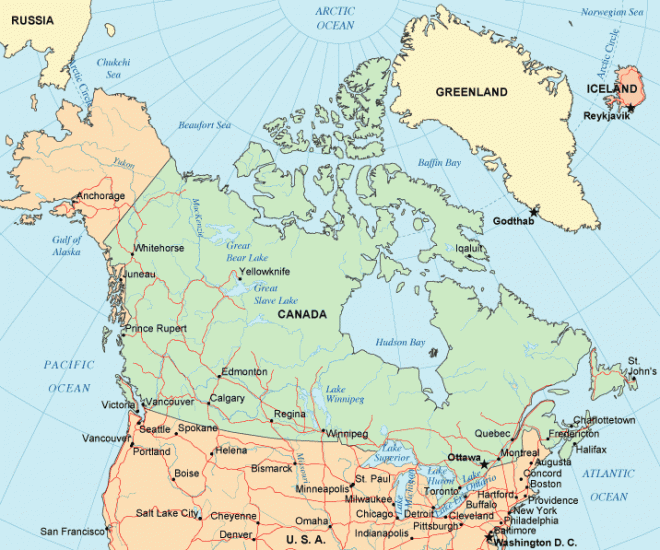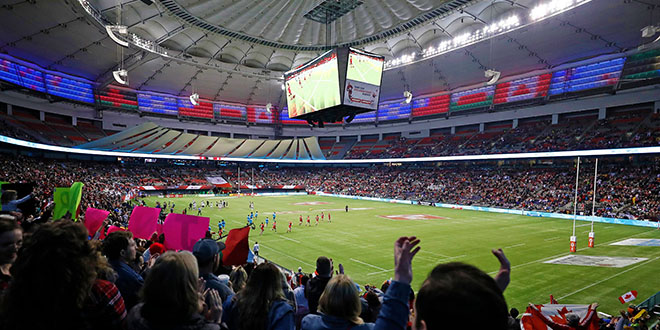The Americas is the only World Rugby region yet to host a RWC. This could change over the coming decade as bids for RWCs 2027 and 2031 may include countries from the Americas.
Whether it is the towering mountains, massive lakes or the territory itself, Canada qualifies as large. The country is officially the second largest in the world. It also has the tenth largest economy, making it an attractive possibility as a RWC host. If Rugby Canada were able to obtain government backing and produce a model that demonstrates the market potential then it could bid. Such a possibility would require an expanded Rugby Canada institutional structure.
World Rugby are interested in moving the RWC around the world. They have openly encouraged the USA to bid and met with former Argentine president, Mauricio Macri over the possibility of that country staging the event.
WORLD CUP PERFORMANCES
| RWC | FINAL PLACING | RESULTS |
| 1987 | Group Stage |
Won vs Tonga Lost vs Ireland, Wales |
| 1991 | Quarter Finalists |
Won vs Fiji, Romania Lost vs France, New Zealand |
| 1995 | Group Stage |
Won vs Romania Lost vs Australia, South Africa |
| 1999 | Group Stage |
Won vs Namibia Lost vs Fiji, France |
| 2003 | Group Stage |
Won vs Tonga Lost vs Italy, New Zealand, Wales |
| 2007 | Group Stage |
Draw vs Japan Lost vs Australia, Fiji, Wales |
| 2011 | Group Stage |
Won vs Tonga Draw vs Japan Lost vs France, New Zealand |
| 2015 | Group Stage | Lost vs France, Ireland, Italy, Romania |
| 2019 | Group Stage |
Draw vs Namibia * (cancelled match) Lost vs Italy, New Zealand, South Africa |
Canada are part of an elite group of RWC competitors. The country has competed in every RWC and the 1991 campaign saw Canada reaching the Quarter Finals. RWC 2019 hosts, Japan, were Quarter Finalists for the first time last year.
Upon being allocated hosting rights, the Asian country was a different prospect. It had one win over Zimbabwe and two draws against Canada on its resumé. For this reason the level of Canada at present need not be considered on its own and nor should it be grounds to dismiss a bid.
RWC HOSTING CRITERIA
The World Rugby administration is firm in demanding financially sound bids. The majority of voters on the World Rugby Council agree which was a leading reason for why France secured RWC 2023 hosting rights despite World Rugby having preferred South Africa.
In addition to market size, facilities are vital. World Rugby’s requirement is a venue seating 60,000 spectators for the RWC Final. Additional stadium sizes are flexible with France 2023 having nine venues, a lower number than all tournaments in the professional era. France 2023 will not have venues comparable to Launceston and Wollongong (2003); Invercargill, Nelson, Palmerston North and Whangarei (2011); Exeter and Gloucester (2015); or Kamaishi (2019) which all seated under 20,000 spectators.
Japan 2019 featured twelve venues, while the 2002 FIFA World Cup had ten Japanese venues and a further ten in South Korea. Five of the Japanese venues were repeated, with World Rugby opting for more variety in venue sizes which saw smaller stadiums in Tokyo and Osaka than in the 2002 FIFA World Cup.
RUGBY HOSTING EXPERIENCE
Japan’s RWC 2019 bid followed a failed effort to secure hosting rights to RWC 2011. In hindsight, it was arguably for the best as Japan’s 2019 wins over Ireland, Scotland, and Samoa would have not been likely in 2011.
Like Japan, Canada has experience hosting World Rugby events such as the annual Vancouver Sevens and the defunct Churchill Cup. These events and Canada’s home internationals serve as potential venue locations for a hypothetical RWC 2031 in Canada.
Unlike the USA, Canada’s highest recorded rugby attendance is not over 60,000. The largest crowd in Canada is 29,480 for the 2017 home match against the Maori All Blacks at Toronto’s BMO Field.
If Canada were to host a RWC, larger crowds would be required for certain RWC matches. However, it is essential to note that the attendance and venue size for the 2017 fixture happen to be well within World Rugby standards. One 60,000 capacity venue is required with the remaining being flexible as demonstrated at RWC 2019 with 14,025 attending Fiji vs Uruguay in Kamaishi.
If Canada is able to identify a venue for the final then would it be possible to work around this to accommodate the remaining play-off’s and the pool matches? This is a central question to assessing Canada’s facilities as a potential host.
WHERE TO HOST RWC MATCHES
Canada does not have an official home venue for rugby. The size of the country contributes to home games being divided between the east and west, although there is no written rule that determines the allocation of Canada’s home games.
If Canada were to host a RWC it would be very different to the 2020 home matches. This year’s home internationals are at parks rather than stadiums in Montreal, Halifax, Calgary and Winnipeg.
Vancouver’s BC Place has received larger rugby crowds than BMO Field. All 66,000 tickets were sold for the two-day 2017 Canada Sevens and the capacity was expanded to 76,000 for 2018 and 73,819 were in attendance for the 2019 event.
BC Place seats 54,500, a close number to that required by World Rugby. As such, a hypothetical RWC 2031 in Canada would require either an expanded capacity to 60,000 or for the final to take place in a different location.
ACCESSIBILITY
Canada is a huge country, although if it were to host a RWC then all games would in cities near the southern border. While this does cut down on distances, mobility is not a simple task as (a) train travel can be more expensive than flying in the country and (b) meeting the demand would require careful planning. This may require dividing the pools, or marquee teams, geographically
If Rugby Canada and World Rugby were able to obtain Air Canada as a sponsor then the logistics would be simplified. The carrier has hubs in Montreal, Toronto, Calgary, and Vancouver. These four cities could loosely be the center-point for one pool each – Atlantic, Ontario, Central Canada and West. Such a scenario would see an overlapping of matches per pool within the regions, to enable examples such as Japan to be based in Vancouver yet also play in Regina, and Hamilton.

VENUE SELECTION
By contrasting Japan 2019 to France 2023 it is safe to suggest that a twelve venue tournament is the viable pathway for a hypothetical Canada 2031. Toronto and Vancouver loom as the most important cities and need large venues for this reason. The means to changing this status quo, likely exist in other Canadian cities gaining Major League Rugby teams. However, presently there are no such projects.
The sample of twelve venues below are listed in order from east to west. St. Johns has a small capacity which, like Nelson (2011) and Kamaishi (2019), could be increased with temporary seating. The remaining venues listed are comparable to sizes from RWC 2019.
The twelve hypothetical venues are located nationwide, although Toronto has two venues. This is similar to Tokyo in 2019; London in 2015; Auckland in 2011; Paris in 2007; and Sydney in 2003, which all had two or three venues.
Montreal’s Stade Saputo seats less than half the capacity of the Olympic Stadium, yet it is arguably a more appropriate size than the 56,040 capacity venue which hosted the 1976 Summer Olympic Games. Toronto, Edmonton (and Calgary), and Vancouver give Canada large venues to spread key matches. They do not, however, resolve the issue of a 60,000 capacity venue. Thus, Canada 2031 would require one of four solutions: (a) World Rugby enable Canada to host with a lower capacity; (b) one of the venues is upgraded; (c) temporary seating is used; or (d) a new venue is constructed.
| CITY | VENUE | CAPACITY |
| St. Johns | King George V Park | 10,000 |
| Halifax | CFL Stadium * Proposed | 24,000 |
| Montreal | Stade Saputo | 20,801 |
| Ottawa | TD Place Stadium | 24,000 |
| Toronto | Rogers Center | 52,230 |
| Toronto | BMO Field | 30,991 |
| Hamilton | Tim Hortons Field | 23,218 |
| Winnipeg | IG Field | 33,500 |
| Regina | Mosaic Stadium | 33,350 |
| Edmonton | Commonwealth Stadium | 56,400 |
| Calgary | McMahon Stadium | 46,020 |
| Vancouver | BC Place | 54,500 |
VERDICT
Canada’s distances and domestic transportation systems mean that either a joint bid with the USA, or a subhosting bid loom as more realistic. In the event that the USA were to bid for RWC 2031, Toronto is well positioned to tender itself based on MLR and its accessibility to USA hubs. Without additional Canadian MLR teams, this status will be complicated to alter, which means Canada as a subhost for a hypothetical North American RWC is far from guaranteed. In short, Canada 2031 is plausible, yet it is a long shot.
 Americas Rugby News Rugby news from across the Americas!
Americas Rugby News Rugby news from across the Americas!




